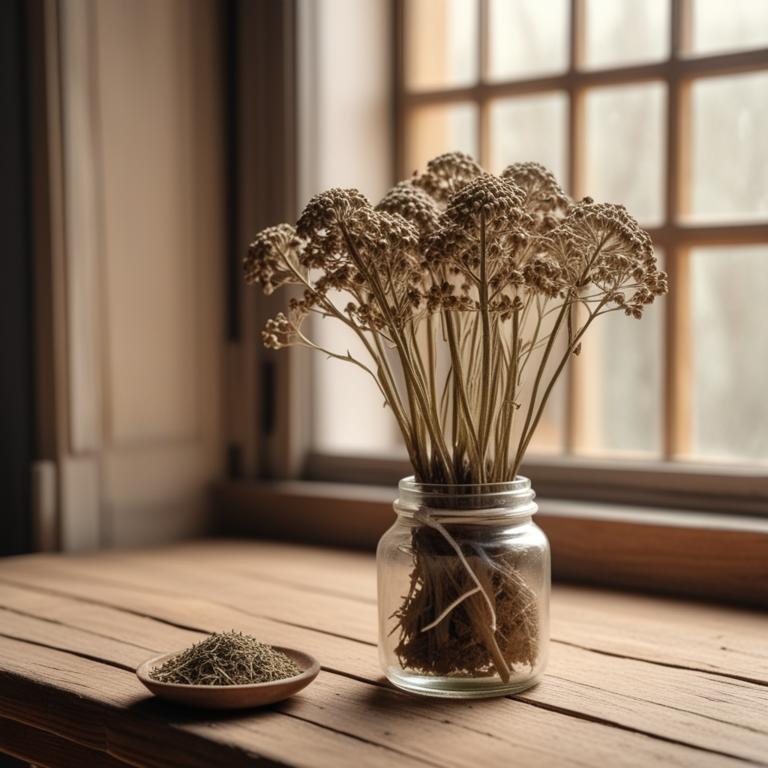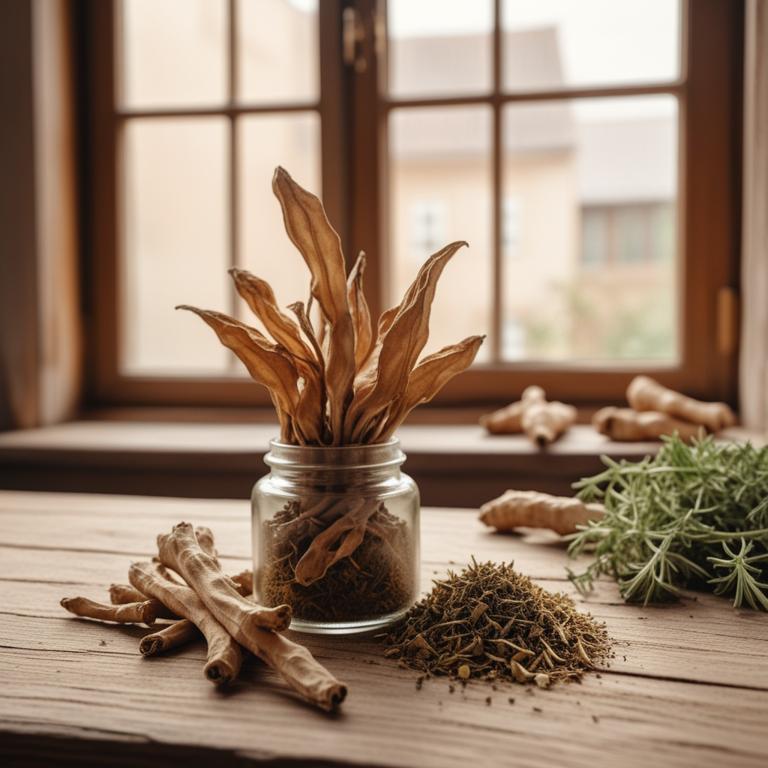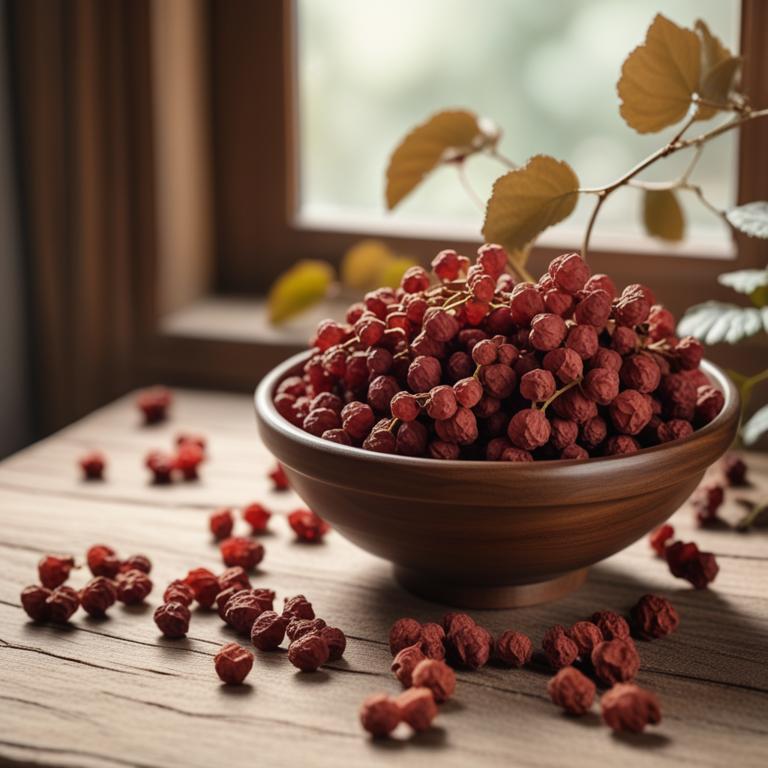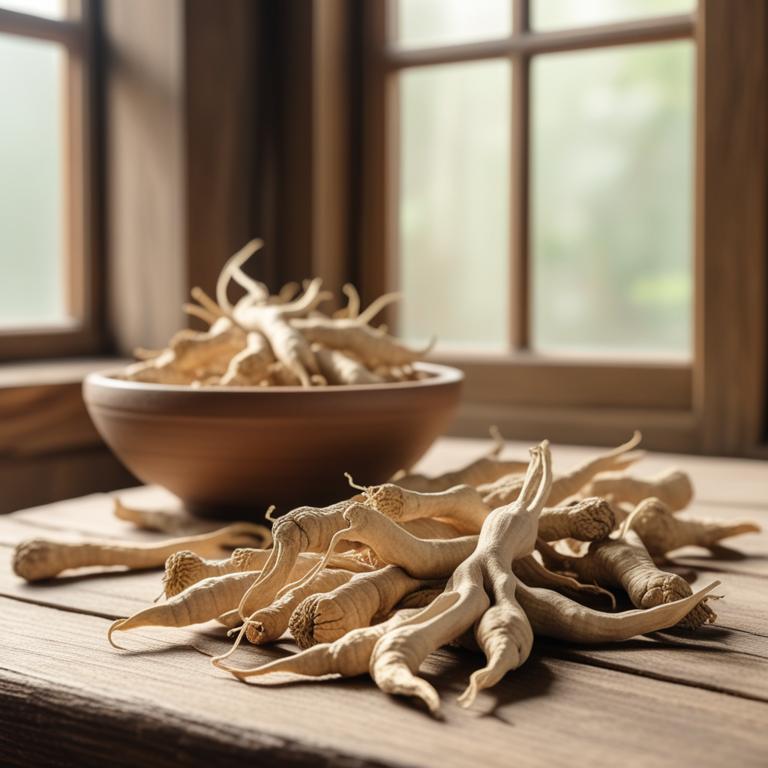Updated: Dec 1, 2024
Migraine: Understanding the Causes and Herbal Remedies
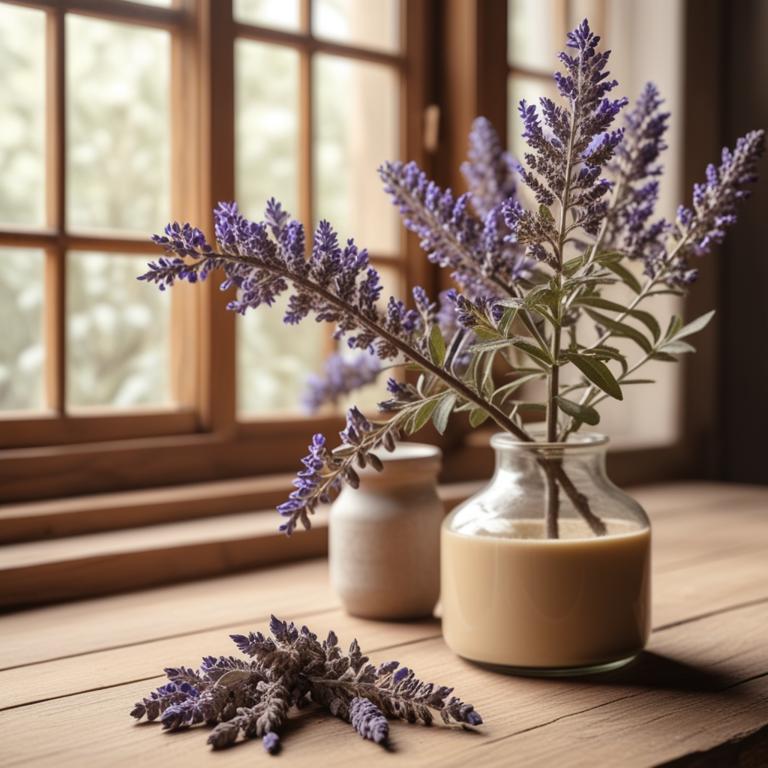
Migraines are severe headaches that can disrupt your life.
They can cause pain on one side of the head, nausea, and sensitivity to light and sound. Some people experience aura symptoms, such as seeing flashes or feeling numbness before the headache starts. Migraines are often triggered by stress, certain foods, hormonal changes, and lack of sleep. The exact cause of migraines is not known, but it's thought to be related to blood vessel constriction and chemical imbalances in the brain. For some people, migraines can be a recurring problem, affecting their daily activities and relationships.
Herbal remedies have been used for centuries to help alleviate migraine symptoms. Feverfew, a herb with anti-inflammatory properties, has been shown to reduce migraine frequency and severity. Ginger, often used in teas and capsules, can help ease nausea and pain. Peppermint oil, inhaled or applied topically, can also help relax tense muscles and reduce headache symptoms. To use these herbs, you can try drinking feverfew tea or ginger tea, which can be made by steeping dried herbs in hot water. You can also take ginger capsules or apply peppermint oil to your temples.
Some people also use essential oil diffusers or inhale peppermint oil directly from a cloth or handkerchief.
Table of Contents
- What causes the experience of migraine?
- What are the benefits of using herbs in migraine treatment?
- What are the key medicinal herbs associated with migraine relief?
- What are the most commonly used herbal remedies for treating migraine?
- Are there any herbs that you should avoid if you have a migraine?
- FAQ
What causes the experience of migraine?
The main causes of migraine are complex and varied, but some common triggers can help us understand what sets off this debilitating condition.
Hormonal fluctuations, for instance, play a significant role, particularly in women. Changes in estrogen levels during menstruation, pregnancy, or menopause can trigger migraines. This is because estrogen influences the blood vessels in the brain, which can become dilated and lead to pain. Food sensitivity is another significant contributor, with certain foods like gluten, dairy, and citrus fruits often causing migraines in susceptible individuals.
When these foods are consumed, they can trigger an immune response, leading to inflammation and pain in the brain. Stress is also a major migraine trigger, as it can cause muscle tension, blood vessel dilation, and the release of certain chemicals that lead to pain. Sleep deprivation is another common cause, with lack of sleep or irregular sleep patterns disrupting the body's natural balance and leading to migraine attacks. Genetic predisposition also plays a significant role, as people with a family history of migraines are more likely to experience them. This is because certain genetic traits can affect the way the body processes pain and other factors that contribute to migraines.
Lastly, menstruation itself can trigger migraines in some women, possibly due to changes in hormone levels or other physiological changes that occur during this time.
What are the benefits of using herbs in migraine treatment?
Using herbs to help with migraines can be really effective.
One of the main benefits is that they can help reduce the frequency and severity of migraine attacks. These herbs can help calm the nervous system, which can become overactive and trigger a migraine. They can also help improve blood flow to the brain, reducing inflammation and pain.
Some herbs can even help stabilize mood and emotions, which can be a trigger for migraines. Additionally, these natural remedies can be less likely to cause side effects compared to prescription medications. This makes them a great option for people who want to try a more natural approach to managing their migraines.
They can also be used in combination with other treatments to enhance their effectiveness.
What are the key medicinal herbs associated with migraine relief?

Herbs have been used for centuries to help manage migraine symptoms, and for good reason.
Let's take a look at some of the most effective ones. Zingiber officinale, or ginger, is great for nausea and vomiting, two common symptoms of migraines. It has anti-inflammatory properties that help soothe the stomach and reduce pain. Ginkgo biloba is another powerful herb that can help with migraines. It improves blood flow to the brain, which can help prevent migraines from occurring in the first place. It also has anti-inflammatory and antioxidant properties that reduce inflammation and oxidative stress, both of which can trigger migraines. Mentha x piperita, or peppermint, is a natural pain reliever and can help ease migraine symptoms.
It has a cooling effect that can help numb the pain and reduce inflammation. Many people also find that the scent of peppermint can be calming and soothing, which can help reduce stress and anxiety that can trigger migraines. Valeriana officinalis, or valerian root, is a natural relaxant that can help calm the mind and body. It contains chemicals that can help reduce stress and anxiety, which are common triggers for migraines. It also has a sedative effect that can help people fall asleep, which is essential for managing migraines. Foeniculum vulgare, or fennel, is another herb that can help with nausea and vomiting, two common symptoms of migraines. It has anti-inflammatory properties that can help soothe the stomach and reduce pain. It also has a natural anesthetic effect that can help numb the pain and reduce inflammation.
These herbs can be used in various forms, such as teas, capsules, or essential oils, and can be used in combination with other treatments to help manage migraine symptoms.
What are the most commonly used herbal remedies for treating migraine?

Herbal preparations can be really helpful in managing migraines.
A decoction is a strong tea made by boiling herbs, and it's great for migraines because it can help relax tense muscles and calm the mind. For example, feverfew decoction can reduce inflammation and ease migraine pain. A tincture is a concentrated liquid made by soaking herbs in a solvent, and it's often used to relieve migraine symptoms quickly. Peppermint tincture, for instance, can help ease nausea and reduce pain. An infusion is a gentle tea made by steeping herbs in hot water, and it's perfect for migraines caused by stress and anxiety.
Chamomile infusion, for example, can calm the mind and promote relaxation. A salve is a topical cream or ointment made from herbs, and it's excellent for migraines that cause headaches and facial pain. Topical applications like lavender salve can help ease pain and reduce inflammation. Herbal capsules are another form of preparation that can be helpful in managing migraines. These capsules contain dried herbs that can be easily absorbed by the body, and they're great for migraines caused by digestive issues. For instance, ginger capsules can help reduce nausea and alleviate pain.
Incorporating herbal preparations into your migraine management plan can be a great way to find relief from symptoms and reduce reliance on medication.
Additional Resources:
Are there any herbs that you should avoid if you have a migraine?
If you have migraines, it's best to steer clear of Strychnos nux-vomica, also known as nux vomica, as it contains a compound that can trigger or worsen migraines due to its ability to cause blood vessels to constrict and dilate rapidly.
Cinnamomum verum, or true cinnamon, can also be a problem, as its strong oil can cause blood vessels to swell, leading to migraine pain. Similarly, Piper nigrum, or black pepper, contains a chemical that can cause blood vessels to expand, which can also trigger migraines. Hydrastis canadensis, or goldenseal, contains a compound that can stimulate the brain and nervous system, potentially leading to or exacerbating migraines.
Cinchona officinalis, or Peruvian bark, contains a substance that can slow down the heart rate and cause blood vessels to constrict, which can worsen migraine symptoms.
FAQ
Are there any specific herbs that can prevent migraine?
Some herbs, like feverfew and butterbur, have been studied for their potential to help prevent migraines. Feverfew contains compounds that may reduce inflammation and block pain pathways, while butterbur has been shown to have anti-inflammatory properties and may help stabilize blood vessels.
Is it safe to use herbal remedies for migraine during pregnancy?
Using herbal remedies for migraines during pregnancy can be a bit tricky.
Some herbs like feverfew and butterbur may help ease migraine symptoms, but they can also affect the fetus.
It's best to talk to your doctor before trying them, but if you do, make sure to follow the recommended dosage and listen to your body, as some herbs can have strong effects.
Are there any herbs that can reduce the frequency of migraine?
Some people find relief from migraines with the herb feverfew.
It's thought that feverfew's chemicals can ease inflammation and relax blood vessels, which may help reduce migraine frequency. Research suggests that taking a feverfew supplement regularly might lower the number of migraines someone experiences.
More studies are needed to confirm its effectiveness.
Related Articles

Causes and Natural Remedies for Stress Management

Earache Treatment with Natural Medicinal Herbs and Herbal Remedies
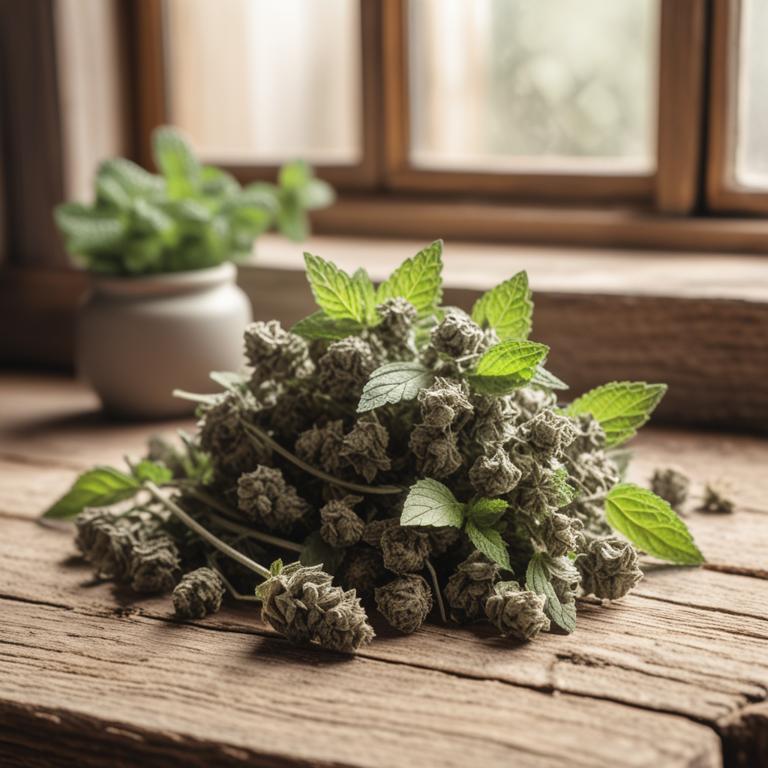
Migraine: Understanding the Causes and Herbal Remedies

Motion Sickness Causes and Medicinal Herbs for Relief
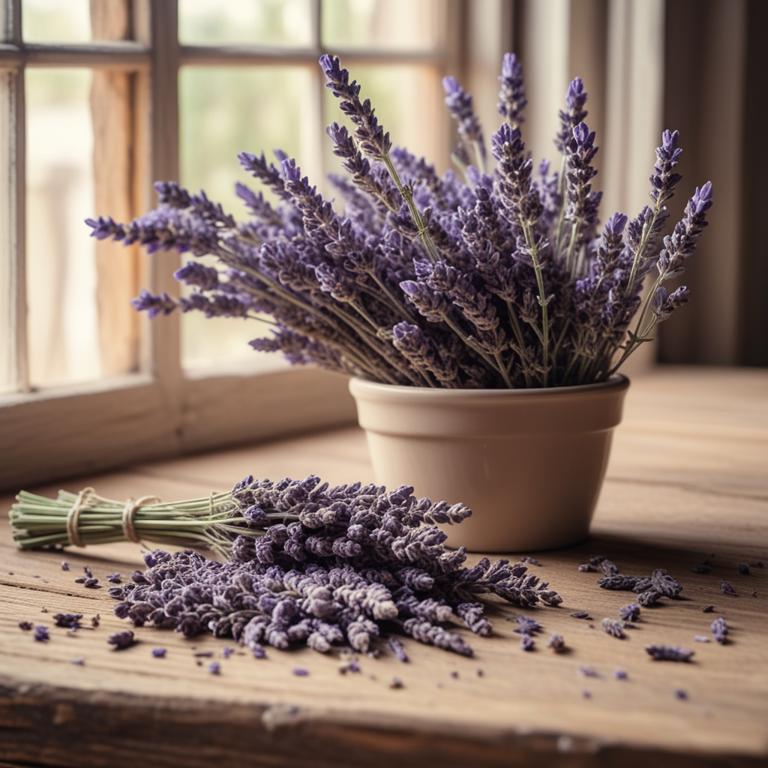
Natural Remedies for Sleep Deprivation: Causes, Medicinal Herbs, and Herbal Preparations
